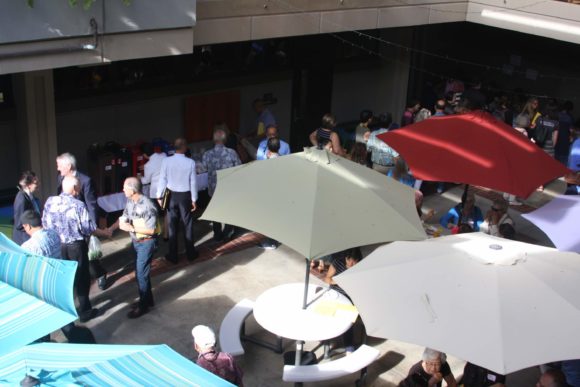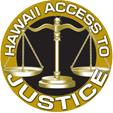
Over 300 attendees participated in the 2018 Hawai‘i Access to Justice Conference on Friday, June 29, 2018. The conference’s theme was “Fighting for Access to Justice for All” with keynote speaker, Chief Judge Robert A. Katzman, United States Court of Appeal, Second Circuit, providing eloquent remarks on civil access to justice for low-income immigrants.
Chief Justice Mark Recktenwald recognized a unique individual who has been advocating increased access to the courts and increased support for the legal service providers long before there was an Access to Justice Commission and before Hawaii received attention for its efforts in access to justice. The recognition for Gary Slovin was a surprise for him.
“Gary is someone who does not seek the spotlight, but I’d like to take a moment today to acknowledge his extraordinary contributions to the access to justice movement in Hawaii,” said Chief Justice Recktenwald. He continued:
Gary has been a lifelong advocate for those who are marginalized and without power, going back to his first years as an attorney in Philadelphia, where he did pro bono work for the civil rights and anti-war movements. In Hawaii, he has used his extraordinary skills in governmental relations to advance the cause of access to justice, such as serving as a key player in the group that successfully advocated to get the Indigent Legal Assistance Fund, or ILAF, made permanent. ILAF helps to fund low-income service providers and is a crucial source of financial support for many legal services providers in the state. Gary has continued to tirelessly advocate for funding for legal services providers at the legislature every year, representing both the ATJ Commission and HJF — all pro bono!
Chief Justice Recktenwald noted that Mr. Slovin’s “advocacy is consistent and yet agile, principled and practical, and always informed by his passionate commitment to providing justice for all.” Presenting him with certificates of recognition were Chief Justice Recktenwald, Representative Della Belatti, on behalf of the legislature, and Justice Acoba, on behalf of the Commission.
Commission Chair Justice Acoba highlighted the activities of the Commission during the past year in his morning remarks. He noted that this is the tenth annual Access to Justice Conference. He said, “A decade ago, we could not foresee what the Commission would become.” He said:
The Commission and its committees started out as and remain today an entirely volunteer effort—its members contribute their time, expertise, and funds, in order to meet the Commission’s objectives. The impact of the Commission has been to heighten and to broaden awareness of the need for civil legal assistance and to provide a platform for shared opportunities to advance equal justice.
Access to justice considerations have become an integral part of practically every discussion involving the law, the judiciary, the bar, and to some extent social concerns beyond the legal system. We have established a broad commonality of interest and purpose for the future. But maintaining a high level of accomplishment and achievement requires committed leadership, and we thank Chief Justice Recktenwald for providing that leadership.
In his opening remarks, Chief Justice Recktenwald stated that there is an “extraordinary access to justice movement in Hawaii” and:
It truly is a grassroots movement, made up of people who are passionate about providing justice for all, and who are willing to work hard to make it a reality. We have strong organizations that provide the framework for that effort — the Hawaii State Bar Association, the William S. Richardson School of Law, legal services providers, the Access to Justice Commission, and the legislature. As a result of that hard work, people from around the country have begun to look closely at our efforts and have begun to invest in what we are doing, to see how far forward we can move, and whether our innovations could work elsewhere.
Recognizing that “we have the opportunity to make a positive impact on the lives of individuals who desperately need help” and that there was still much work to do, Chief Justice Recktenwald acknowledged and thanked all:
We would not be where we are today without every single person involved—every organization that stood up to advocate for justice on behalf of those whose voice wouldn’t be heard, every volunteer who took time away from work to volunteer at a self-help center, every Access to Justice commissioner or committee member who brainstormed, debated, and toiled over the vision for access to justice in Hawaii.
Chief Judge Robert Katzmann said:
All of us here have a common concern: ensuring adequate legal representation of the immigrant poor. A courtroom has multiple players with different roles, but all would agree that adequate legal representation of the parties is essential to the fair and effective administration of justice. Deficient representation frustrates the work of courts and ill serves litigants. All too often, and throughout the country, courts that address immigration matters must contend with such a breakdown in legal representation, a crisis of massive proportions, with severe, tragic costs to immigrants and their families. For our nation’s immigrants, the urgent need for competent counsel in deportation proceedings has never been more critical. This nation’s immigrant representation problem is twofold: 1) there is a profound lack of representation, indicated by the fact that 40 percent of noncitizens in deportation proceedings do not have representation nationwide; and 2) in far too many deportation cases, the quality of counsel is substandard. Immigrants are easy prey for unscrupulous lawyers, who gouge their clients out of scarce resources and provide shoddy legal services. Nationwide, some 63% of immigrants do not have counsel, there being no right to appointed counsel in immigration court. For low income immigrants, having an attorney is the difference between being allowed to stay in this country and suffering catastrophic deportation.
Chief Judge Katzmann explained that his work on immigrant representation was guided by “Canon 4 of the Code of Conduct for United States Judges, which, to the extent that a judge’s time permits and impartiality is not compromised, encourages judges to contribute to the law, the legal system, and the administration of justice.”
Chief Judge Katzmann described two entities that he created to meet the need: the Study Group on Immigrant Representation and the Immigrant Justice Corps, “the nation’s first and only national fellowship program for recruiting and training lawyers to provide representation for the low-income immigrants. Chief Judge Katzmann said that in four years the Immigrant Justice Corps served more than 43,000 immigrants and their families.
Chief Judge Katzmann opined:
Immigrants are largely a vulnerable population of human beings who come to this country in the hopes of a better life, often entering without knowledge of the English language or American culture, in economic deprivation and in fear. Too often, the lack of adequate counsel for immigrants all but eliminates their hopes to experience the American dream, to live with their families openly and with security, to contribute to their new country. This failure should be a concern for all of us.: I think we can all imagine our own ancestors or the ancestors of friends and relate to the anxieties of today’s newcomers. We are a nation of immigrants, whose contributions have been vital to whom we are and hope to be. As the son of an immigrant from Nazi Germany and the grandson of immigrants from Russia, I know from my own experience about family members who came to this country, dedicated themselves to this country, and made our great nation even stronger.
He believed that “quality representation is especially acute for immigrants.”
He emphasized that “justice should not depend upon the income level of immigrants. A lawyer’s duty to serve those unable to pay is not an act of charity or benevolence, but rather one of professional responsibility.”
So began his launch of a working group, the Study Group on Immigrant Representation, comprised of 70 lawyers from a range of law firms, non-profit entities, bar organizations, immigrant legal service providers, immigrant organizations, law schools, federal, state, and local governments and judicial colleagues. “The Study Group work has focused on three areas: (1) increasing pro bono activity of firms, especially at the outset of immigration proceedings; (2) improving mechanisms of legal service delivery; and (3) rooting out inadequate counsel and improving the quality of representation.”
The speeches and summaries of the workshops and closing plenary sessions are provided below:
Welcoming remarks of Commission Chair Justice Simeon Acoba (ret.)
Opening remarks by Hawaii Supreme Court Chief Justice Mark E. Recktenwald
“Addressing the Desperate Legal Needs of the Immigrant Poor” by Chief Judge Robert A. Katzmann
Collaborations and Innovation for Equal Justice summary
Technology in Mediation to Increase Access to Justice summary
Priorities for the Low-Income Resident on State Budget and Tax Issues summary
Incubating Innovation in Access to Justice summary
Expanding Civil Access to Justice in Prisons and Jails summary
Access to Justice for the Low-Income Employee (Workers’ Rights) summary
Sexual Harassment and Access to Justice summary
Ensuring Access to Justice with the Hawaiian Language summary
Alternative Dispute Resolution in Family Court Cases summary
Access to Justice for Immigrants summary
Understanding Hawaii’s Affordable Housing Puzzle summary
Initiatives to Enhance Access to Civil Justice summary
